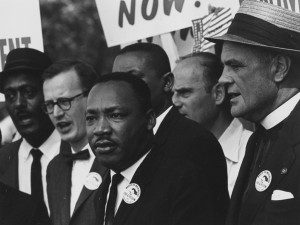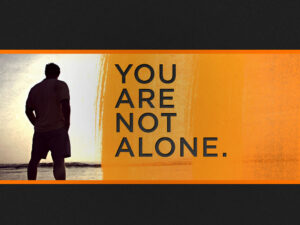Dangerous Unselfishness
 On Monday our nation sets aside time to recognize the legacy of Dr. Martin Luther King, Jr. While growing up in Alabama, I lived 150 miles from where he marched in Selma. For 17 years living in Arkansas, I lived 100 miles from where he was killed in Memphis. It is undeniable that he played a significant role in a time of turmoil and change. Regardless of what people may think about the man, his methods or his politics, for many he symbolizes the desire for unity, service and concern for our fellow man. You have probably heard his “I Have a Dream” speech repeated around this time of year. Below is a section of another speech he gave the day before his assassination.
On Monday our nation sets aside time to recognize the legacy of Dr. Martin Luther King, Jr. While growing up in Alabama, I lived 150 miles from where he marched in Selma. For 17 years living in Arkansas, I lived 100 miles from where he was killed in Memphis. It is undeniable that he played a significant role in a time of turmoil and change. Regardless of what people may think about the man, his methods or his politics, for many he symbolizes the desire for unity, service and concern for our fellow man. You have probably heard his “I Have a Dream” speech repeated around this time of year. Below is a section of another speech he gave the day before his assassination.“Let us develop a kind of dangerous unselfishness. One day a man came to Jesus, and he wanted to raise some questions about some vital matters of life. At points he wanted to trick Jesus, and show him that he knew a little more than Jesus knew and throw him off base. Now that question could have easily ended up in a philosophical and theological debate. But Jesus immediately pulled that question from mid-air, and placed it on a dangerous curve between Jerusalem and Jericho. And he talked about a certain man, who fell among thieves. You remember that a Levite and a priest passed by on the other side. They didn’t stop to help him. And finally a man of another race came by. He got down from his beast, decided not to be compassionate by proxy. But he got down with him, administered first aid, and helped the man in need. Jesus ended up saying, this was the good man, this was the great man, because he had the capacity to project the ‘I’ into the ‘thou,’ and to be concerned about his brother.”
That kind of concern for brothers is something the young church at the end of Acts 2 places a lot of importance on. They learned together. They prayed together. They shared what they had. They took care of one another’s needs. Their number grew as a result.
So many of the things that God tells us to do involve how we treat each other. Honor your father and mother. Turn the other cheek. Forgive. Value others above yourselves. Love your neighbor.
To be followers of Christ we have to see every person we encounter as a valuable creation of the Father. Each person is someone that He wants to bring closer to Him. It is up to us to show them His love. It’s not always easy, and it might be a little uncomfortable. Maybe we all should develop that same kind of dangerous unselfishness that Dr. King spoke about.
Staying Connected and Staying Found
 Since becoming a Christian as an 8th grader, I have probably heard the word “lost” in church contexts more than anywhere else in life. We are concerned about reaching the lost, because Jesus said the reason He came to earth was “to seek and save the lost” (Luke 19:10). In fact, Paul tells Timothy that God “desires all people to be saved and to come to the knowledge of the truth” (1 Timothy 2:4). As wonderful as it is to see someone come to salvation through Christ, we know that too often the found end up getting lost again.
Since becoming a Christian as an 8th grader, I have probably heard the word “lost” in church contexts more than anywhere else in life. We are concerned about reaching the lost, because Jesus said the reason He came to earth was “to seek and save the lost” (Luke 19:10). In fact, Paul tells Timothy that God “desires all people to be saved and to come to the knowledge of the truth” (1 Timothy 2:4). As wonderful as it is to see someone come to salvation through Christ, we know that too often the found end up getting lost again.Luke 15 relates the plight of the lost and the One who desperately wants to find them through parables of the lost sheep, the lost coin and the lost son. Although each is lost for a different reason (negligence, wandering or choice), the result is the same. They are lost.
In the book The Great Dechurching: Who’s Leaving, Why Are They Going, and What Will It Take to Bring Them Back?, the authors surveyed people who have left churches for a number of reasons. The various reasons people leave are compounded by the lack of connection or belonging. That is a problem that we can all work to improve. The book describes it this way.
“If we claim to believe and behave but do not belong, we become a lone ranger Christian. While we have a category for shut-ins and other challenging circumstances, the Bible seems fairly clear that we are a people who gather together physically. Our lack of belonging is in itself a behavioral issue. The author of Hebrews tells us not to neglect meeting together. In every city where the gospel was preached in Acts, the new believers were connected to a local church. We are given dozens of ‘one anothers’ in Scripture that can only be carried out as we belong to a local church. When we neglect the Bible’s exhortations to belong, we can become stagnant and dull in our faith.”
We need to encourage one another not to neglect meeting together, not to become stagnant and not to be disconnected; but it can still be easy for someone to drift away unnoticed like that lost coin. Let’s all look out for one another and encourage one another to stay connected!
Brian
“Abide in me, and I in you. As the branch cannot bear fruit by itself, unless it abides in the vine, neither can you, unless you abide in me. I am the vine; you are the branches. Whoever abides in me and I in him, he it is that bears much fruit, for apart from me you can do nothing.” – John 15:4-5
Lonely or Connected?
 In the U.S. today, people are probably as isolated and lonely as they have been at any point in history. It seems strange, because we also have more ways to connect than at any point in history. How can both of those seemingly opposite statements be simultaneously true? Does that problem extend into the life of the church?
In the U.S. today, people are probably as isolated and lonely as they have been at any point in history. It seems strange, because we also have more ways to connect than at any point in history. How can both of those seemingly opposite statements be simultaneously true? Does that problem extend into the life of the church?In his book, Why Do We Feel Lonely at Church?, Jeremy Linneman addresses the epidemic of loneliness. “I’ve studied loneliness, belonging, and community, and I’m convinced we don’t fully understand the pervasiveness of individualism—and how much it is hurting us as believers. To what extent do Christians experience loneliness? And how can the church respond to the loneliness epidemic?”
God designed the church to be a place where we are connected. When you think of the various analogies used in scripture, connection is necessary and assumed. The church is the branches attached to the Vine, the body and His family—all things that depend on and thrive through connection. Still, many can feel disconnected. We should not be content with that.
Linneman has a word of encouragement or motivation for us. For the introverts, it might even be a challenge, but it is a worthwhile one. “If you are finding it hard to make friends, you’re not crazy. Friendship is challenging in a society like this—even in the church. But the answer is not to lower your expectations and prepare for loneliness. The answer is to confront the challenge directly, reject the isolation and division of our times, and embrace real, meaningful, face-to-face relationships with imperfect people. By God’s grace and intentional steps, we can do this. You belong here.”
Like so many things in life, it will take our effort to connect in deeper community. Let’s keep connecting as family here at Southwest. That’s the plan God has for us.
Brian
For just as the body is one and has many members, and all the members of the body, though many, are one body, so it is with Christ. – 1 Corinthians 12:12
Empathy
 It is rare that I read a book just based on the title, but the book I am reading now is one I started for that exact reason. The book is Learning to Disagree: The Surprising Path to Navigating Differences with Empathy and Respect by John Inazu. Maybe that title appeals to you as well. When I think of how disagreements tend to play out in America in 2024, empathy and respect are not usually words I would use to describe the sides I see in disagreement. In fact, they are often as far away as I could imagine. I am only in chapter two, so this is not a recommendation yet. However, the author asks a question in chapter one that is important to people in general, but especially important to people who are supposed to be known for our love.
It is rare that I read a book just based on the title, but the book I am reading now is one I started for that exact reason. The book is Learning to Disagree: The Surprising Path to Navigating Differences with Empathy and Respect by John Inazu. Maybe that title appeals to you as well. When I think of how disagreements tend to play out in America in 2024, empathy and respect are not usually words I would use to describe the sides I see in disagreement. In fact, they are often as far away as I could imagine. I am only in chapter two, so this is not a recommendation yet. However, the author asks a question in chapter one that is important to people in general, but especially important to people who are supposed to be known for our love.“How do we learn empathy?”
I think most of us are good at empathy with people who are like us or people who are dealing with similar challenges in life. We might struggle more with people who come from different backgrounds, think differently and have values or hold opinions we disagree with. Yet we are still called to love people like that. That love calls us toward empathy. The kind of empathy described in this book sounds quite a bit like the empathy we find in scripture. Inazu says this about empathy:
“Empathy is not rocket science. It’s hearing an unfamiliar or off-putting argument, pausing to think about what has been said and responding with an appropriately engaged question. It’s giving people the benefit of the doubt because you may not know what battles they are fighting. It’s treating others the way you would like to be treated. Empathy is the simple stuff that’s hard to put into practice.”
“Empathy is not rocket science. It’s hearing an unfamiliar or off-putting argument, pausing to think about what has been said and responding with an appropriately engaged question. It’s giving people the benefit of the doubt because you may not know what battles they are fighting. It’s treating others the way you would like to be treated. Empathy is the simple stuff that’s hard to put into practice.”
In short, hear, pause, respond appropriately and give the benefit of the doubt. As followers of Jesus, we should lead the way on empathy. It is the example He gave us when He encountered people who others dismissed. He is the one who taught us that people who are come from different backgrounds, think differently and have values or hold opinions we disagree with are still our neighbors. Let’s strive to love and understand them better.
Brian
“Put on then, as God’s chosen ones, holy and beloved, compassionate hearts, kindness, humility, meekness, and patience, bearing with one another and, if one has a complaint against another, forgiving each other; as the Lord has forgiven you, so you also must forgive.” – Colossians 3:12-13
Faith In Troubled Times
 On Sunday evenings in April, we are talking about faith and doubt. As we discussed last week, a common faith problem is that we sometimes put our faith in the wrong things. People trust their resources, themselves or others above God. Even though faith was placed elsewhere, the same people might blame God when things do not go according to plan. When those things and people let us down and circumstances get worse, God remains. He was there before, but His people can be too busy making their own solutions to see His presence clearly.
On Sunday evenings in April, we are talking about faith and doubt. As we discussed last week, a common faith problem is that we sometimes put our faith in the wrong things. People trust their resources, themselves or others above God. Even though faith was placed elsewhere, the same people might blame God when things do not go according to plan. When those things and people let us down and circumstances get worse, God remains. He was there before, but His people can be too busy making their own solutions to see His presence clearly.Amazingly, He told us in scripture that He works that way. Sometimes He shows us through the example of who He chooses to be part of His mission. Author Jon Acuff captures this idea well. “God found Gideon in a hole. He found Joseph in a prison. He found Daniel in a lion’s den. He has a curious habit of showing up in the midst of trouble, not the absence. Where the world sees failure, God sees future. Next time you feel unqualified to be used by God remember this, he tends to recruit from the pit, not the pedestal.”
When we don’t pick up on the pattern in examples like these, He even spells it out for us through the words of Paul in 2 Corinthians 12:7-10. “So to keep me from becoming conceited because of the surpassing greatness of the revelations, a thorn was given me in the flesh, a messenger of Satan to harass me, to keep me from becoming conceited. Three times I pleaded with the Lord about this, that it should leave me. But he said to me, “My grace is sufficient for you, for my power is made perfect in weakness.” Therefore I will boast all the more gladly of my weaknesses, so that the power of Christ may rest upon me. For the sake of Christ, then, I am content with weaknesses, insults, hardships, persecutions, and calamities. For when I am weak, then I am strong.”
So where is our faith? It is in our all-powerful God, whose power is shown in our weakness. Those moments of weakness that could challenge our faith can actually be reminders of His power. May that strengthen our faith!
Brian
A Faith That Grows
 I love stories in scripture of faith that progresses in the lives of people who encounter Jesus. We looked at one of those stories last month in John 9. The blind man who Jesus heals changes the way he describes Jesus as the chapter goes on. He calls Jesus a man, then calls Him a prophet and recognizes that He must be from God before finally calling Him Lord towards the end of the chapter. There is a similar faith progression that happens in the life of another person mentioned in a few instances throughout John’s gospel.
I love stories in scripture of faith that progresses in the lives of people who encounter Jesus. We looked at one of those stories last month in John 9. The blind man who Jesus heals changes the way he describes Jesus as the chapter goes on. He calls Jesus a man, then calls Him a prophet and recognizes that He must be from God before finally calling Him Lord towards the end of the chapter. There is a similar faith progression that happens in the life of another person mentioned in a few instances throughout John’s gospel.We are first introduced to Nicodemus in John 3. He comes to learn from Jesus at night. Although it is not spelled out for us, that timing of his visits with Jesus indicate that he does not want to be seen with Him. Jesus explains to him that a person must be born again to have a new life with God. He is clearly confused by this teaching, but we do not know in chapter 3 if his life is changed.
We next find Nicodemus in John 7. Jesus has gained popularity, but people are divided about who He is and what His teaching and miracles might mean. As the Pharisees are ready to condemn, Nicodemus speaks up in verse 51: “Does our law judge a man without first giving him a hearing and learning what he does?” There are not many people in John’s gospel other than Jesus who challenge the Pharisees. Nicodemus does here.
We last hear about Him in chapter 19 after Jesus is crucified. Nicodemus and Joseph of Arimathea take the body of Jesus and place Him in the tomb. In verse 39, John reminds us who he is and tells us what he does now. “Nicodemus also, who earlier had come to Jesus by night, came bringing a mixture of myrrh and aloes, about seventy-five pounds in weight.”
Nicodemus went from visiting under the cover of darkness, to speaking words of reason in a tense situation to caring for Jesus after His own apostles were nowhere to be found. What changed from chapter 3 to chapter 19? He encountered Jesus. If Jesus could transform Nicodemus so completely, how could He change your life?
Nicodemus went from visiting under the cover of darkness, to speaking words of reason in a tense situation to caring for Jesus after His own apostles were nowhere to be found. What changed from chapter 3 to chapter 19? He encountered Jesus. If Jesus could transform Nicodemus so completely, how could He change your life?
Brian
“But whoever does what is true comes to the light, so that it may be clearly seen that his works have been carried out in God.” – John 3:21
Ebb and Flow
 According to the Merriam-Webster Dictionary, ebb and flow is “used to describe something that changes in a regular and repeated way.“ That could describe many things in our world. We experience the changing of seasons in nature. Baseball fans are ready tor a new season to begin. We are only a couple of months away from another school year coming to an end. Even in church life, there are regular changes.
According to the Merriam-Webster Dictionary, ebb and flow is “used to describe something that changes in a regular and repeated way.“ That could describe many things in our world. We experience the changing of seasons in nature. Baseball fans are ready tor a new season to begin. We are only a couple of months away from another school year coming to an end. Even in church life, there are regular changes.Last Sunday, Stacey and I visited the congregation in Arkansas where we spent 14 years. Although it was good to reconnect with old friends, we were struck by how many familiar faces were gone and had been replaced by new faces we did not know. Here at Southwest, we experience the same thing.
Within the last few months, the Neill and Conley families have both moved away. Although I have no doubt they will be great additions to new congregations, they will be missed here. Their entire families were active in so many of the ministries that make Southwest the church family that it is. They will be hard to replace, yet the work they did here still needs to be done.
We have suffered losses as people we love dearly have gone on to their reward. We celebrate lives well lived to God’s glory. We know we will meet again, but their absence here is still felt.
We have suffered losses as people we love dearly have gone on to their reward. We celebrate lives well lived to God’s glory. We know we will meet again, but their absence here is still felt.
On the other side of the ebb and flow, we have regular additions and changes to our church family. New members have joined us. Some are old friends, while others are new ones. The sounds of babies and children are a regular part of our gatherings. We have rejoiced as we witnessed transformed lives rise from the waters of baptism.
The ebb and flow is all part of the life of the church. It is such a blessing to be a part of the Southwest family. The God who unites us is the One who will always remain.
Brian
For everything there is a season, and a time for every matter under heaven. – Ecclesiastes 3:1
True Love
 Since we are talking about love on Sunday evenings in March, I was reminded of this Valentine’s Day breakdown from CNN.com that I ran across several years ago. Americans spend quite a bit of money to show their love on Valentine’s Day Here’s a breakdown, by the numbers:
Since we are talking about love on Sunday evenings in March, I was reminded of this Valentine’s Day breakdown from CNN.com that I ran across several years ago. Americans spend quite a bit of money to show their love on Valentine’s Day Here’s a breakdown, by the numbers:- $130.97 — The per person average estimated amount that people spend on Valentine’s Day
- 224 million — The estimated number of roses grown for Valentine’s Day
- 51% — The percentage of people who buy red roses for this holiday
- 64% — The percentage of men who buy flowers for Valentine’s Day
- 36% — The percentage of women who buy flowers for Valentine’s Day
- $18.6 billion — The total spending that is reached by Valentine’s Day
- $1.6 billion — The amount people spend on candy
- $1.9 billion — The amount people spend on flowers
- $4.4 billion — The amount people spend on diamonds, gold and silver
And one of the best statistics: there are 1400 varieties of Valentine’s cards available at Hallmark. 1400 ways to express love. As eloquent as Hallmark may be, we looked at the best description of love last week in 1 Corinthians 13 and it has little to do with the kind of romance we find in cards.
Love is foundational to our relationships. It gives meaning to our actions. It teaches the world around us about the God we serve. Best of all, you do not need to spend $130.97 today to show God’s love to the people you meet. It can be freely given and still holds immeasurable value.
Brian
The Most Important Question
 This week Jet and I will finish our Wednesday night class series. I have mentioned to several people how much I have enjoyed teaching this class. Obviously some of the credit for that belongs to Jet, but I think there’s another piece. I love good questions. There have been a lot of good and difficult questions throughout our study.
This week Jet and I will finish our Wednesday night class series. I have mentioned to several people how much I have enjoyed teaching this class. Obviously some of the credit for that belongs to Jet, but I think there’s another piece. I love good questions. There have been a lot of good and difficult questions throughout our study.I am currently reading John Mark Comer’s book, Practicing the Way: Be With Jesus. Become Like Him. Do As He Did. As someone who loves a good question, the author got my attention when I read the words, “The single most important question is…” Usually we reserve that description for the question asked during someone’s confession of Christ before baptism. Comer writes to people who have already answered the question of who Jesus is, and they desire to be more like Him. It is in that context he asks this question:
“Are we becoming more loving?”
He has a point. It’s a great question. He continues:
“Are we becoming more loving? Not, Are we becoming more biblically educated? Or practicing more spiritual disciplines? Or more involved in church? Those are all good things, but not the most important thing. If you want to chart your progress on the spirituality journey, test the quality of your closest relationships—namely, by love and the fruit of the Spirit. Would the people who know you best say you are becoming more loving, joyful, and at peace? More patient and less frustrated? Kinder, gentler, softening with time, and pervaded by goodness? Faithful, especially in hard times, and self-controlled? Are you growing in love not just for your friends and family but for your enemies? When you are hurt, wounded, and treated unjustly (as we all are), are you finding yourself increasingly able to emotionally release the bitterness, to absorb the pain and not give it back in kind? To pray for and even ‘bless those who curse you’? [Luke 6:28] And is all this feeling more and more natural and less forced? More and more like this is just who you are? If not, then no matter how well you know the Bible, how many books you read, how many insights you amass, or how many practices you build into your Rule of Life, you’re not on track.”
Love is where the Bible we know, the disciplines we practice and the church involvement we value turn into action toward others. Let’s all become more loving.
Brian
The Home We Long For
 It seems like each year there are more books being written about why people are leaving church. One of 2023’s most popular was The Great Dechurching: Who’s Leaving, Why Are They Going, and What Will It Take to Bring Them Back? Although much of the book deals with the questions mentioned in the title, the authors frequently return to point out what makes the church and our worship assemblies so important for our relationship with God. One of the writers, Jim Davis, makes this great analogy about our gatherings.
It seems like each year there are more books being written about why people are leaving church. One of 2023’s most popular was The Great Dechurching: Who’s Leaving, Why Are They Going, and What Will It Take to Bring Them Back? Although much of the book deals with the questions mentioned in the title, the authors frequently return to point out what makes the church and our worship assemblies so important for our relationship with God. One of the writers, Jim Davis, makes this great analogy about our gatherings.“When I lived overseas, every so often I would go onto a US military base. Immediately when you pass the gates, you are on US soil. All the signs are in English, the fashion is American, and you begin to see great dining establishments like Pizza Hut and Burger King. You pay in American dollars, and you see glimpses of home in things like free refills, American architecture, and police cars that make the ‘correct’ siren sound. When on base, we were a small group of very different people far from home but, in a way, home at the same time. That is what the Sunday gathering is for us. We come together as a diverse group of people feeling acutely that we are not home—a people who, in some mysterious way, leave the world we live in to worship the King of our new kingdom. And, for a moment, even if we aren’t truly there, we can taste the home we long for. Our Sunday gathering has a centering effect on us, and to the degree we make the gathering a priority in our lives, we will taste our true home and flourish as citizens of heaven on earth.”
As we gather again this week, I pray that you will be blessed by the reunion and long even more for the home we will all share with the God who loves us.
Brian
